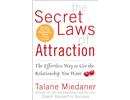
London: Internationally acclaimed Master Certified Coach and bestselling author, Talane Miedaner, knows the secrets to becoming a magnet to success – attracting the relationships, money and opportunities that you
want without even trying!
Find out at the SECRET LAWS OF ATTRACTION ONE DAY EVENT TAKING PLACE AT THE RITZ HTEL, LONDON ON SATURDAY 4TH OCTOBER.
Miedaner’s approach draws on two powerful truths about human nature: “If you don’t NEED it, you are more likely to attract it” and “like attracts like.”
Her famous 7-step program shows how to stop struggling and start going with the flow, how to expand your willingness to have your emotional needs fulfilled, how to orient your life around your core values and passions, how to indulge in excellent self-care and how to become effortlessly successful.
These advanced life coaching techniques will help you reach your goals and attract whatever your heart desires – effortlessly. The old way of reaching goals was to create a strategy with a timeline and specific action steps.
This works for some, yet Talane stresses “why not have a notion of what you want and then have what you want ‘magically’ appear? Once you learn how to effortlessly attract the opportunities and relationships you desire, you will have no wish to achieve these the hard way! It’s time to learn how to structure your life so you can be irresistibly attractive to whatever you desire!”
THE 7-STEP PROGRAM TO INCREASE YOUR POWER TO ATTRACT:
1. Increase your natural energy
2. Make the space
3. Identify and fulfil your emotional needs
4. Orient you life around your passions and values
5. Clarify what you really really want
6. Indulge in excellent self-care
7. Leverage the natural Laws of Attraction
Based on the Principles of Attraction:
v Like attracts like
v If you don’t need it, you are more likely to attract it
v The present really is perfect
v It’s all good, even the bad stuff
v You can have whatever you allow yourself to have .. and more!
The Secret Laws of Attraction One Day Seminar in London costs £250.00 which includes a copy of the book, The Secret Laws of Attraction and luncheon.
Places can be booked on line at www.uklifecoach.comor by calling 01395-271061. The timings for the day are 9am-4:30pm with book signing to follow. Delegates will be able to ask Talane any questions.
About Talane Miedaner
The Secret Laws of Attraction is led by Talane Miedaner, Master Certified Coach, founder of www.lifecoach.com and www.uklifecoach.com and international bestselling author of Coach Yourself to Success – 101 tips for reaching your goals at work and in life, McGraw-Hill.. A leader in the cutting-edge field of personal coaching, Talane is a sought-after international speaker and coaches executives of Fortune 500 companies, entrepreneurs and business owners around the world. She is also author of the audio program: Irresistible Attraction: a way of life and The Secret Laws of Attraction: the effortless way to get the relationship you want is published by McGraw-Hill.


